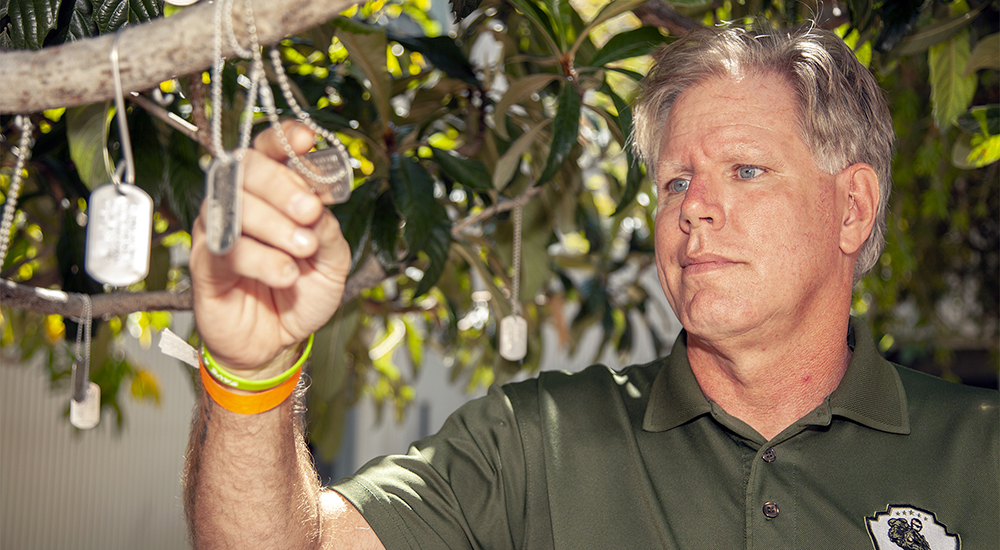These days, Jeff Henson is doing what he believes has been his calling in life. He’s showing people who have attempted or have had thoughts of suicide that there is another way.
The Air Force Veteran (pictured above) is a volunteer at Save A Warrior. The nonprofit provides counseling in mental health, wellness and suicide prevention to Veterans, active-duty military and first responders. More than 1,100 men and women have gone through the program since it began eight years ago.
Many of these people, Henson explains, are missing “their family, their tribe” with whom they once built a friendship and camaraderie in the military or elsewhere. A lot of them not only have PTSD, he says, but PTSD and moral injury, which is essentially a conflict with one’s personal code of morality.
A Veteran may feel guilt, shame or self-condemnation for violating his or her moral beliefs in combat by killing someone, witnessing death or failing to prevent the immoral acts of others.
The will to live
Henson believes moral injury is a form of “complex PTSD” that can also stem from negative circumstances in one’s childhood.
“We introduce a Veteran to a tribe of 12 other Veterans who came to Save A Warrior at the same time as total strangers. They can leave as ‘brothers’ with an understanding that it’s not always what happened down-range that has them stuck in life. We provide hope and magic that is the will to live.”
Henson has been there himself. Diagnosed with PTSD and void of hope, he went through the Save A Warrior program in 2016 while in Veterans’ treatment court in Orange County, California.
Flashbacks from the Gulf War
His court time stemmed from a domestic violence incident in 2013. At the time, he was experiencing many of the classic PTSD symptoms: nightmares, mood swings, anxiety, depression, isolation and flashbacks. When the incident happened, he had flashed back to a moment when he unintentionally witnessed a decapitation in the Saudi capital, Riyadh, during the Gulf War in 1990, and he lost control.
Study links PTSD with criminal justice involvement
Earlier this year, a VA study in the Journal of Traumatic Stress found that Veterans with PTSD — compared to those without — are more likely to have justice involvement.
The researchers say it is unclear what is driving the ties between PTSD and criminal justice involvement. They say the general strain theory may partially explain the results. That theory asserts that the risk of criminal behavior is higher among people who have experienced traumatic events and report negative effects, such as high levels of anger or irritability,
It gave me hope
Meanwhile, as part of getting his life back together, the 59-year-old Henson is pursuing a doctorate in psychology at the California Institute of Integral Studies.
He’s also trying to give back to the organization that gave him so much.
“Save A Warrior did not save my life, but it gave me hope,” he says. “It’s the difference between `being alive’ and `living.’ It’s also about being of service. I’m one of the shepherds who helps people through the process that I went through.
“When we’re kids, we’re told by our parents not to use four-letter words,” he adds. “I dispute that because hope is a four-letter word. And hope is powerful.”
Click here to read more of Henson’s story.
Photos courtesy Benjamin Jones, a visual information specialist for the Long Beach VA Medical Center.
Topics in this story
More Stories
Veteran Byron Potier weighed almost 300 pounds and was tired and lethargic. He was the perfect candidate for gastric sleeve surgery.
How much do you know about VA care, benefits and services? Don’t miss out on what you've earned—check out the "2025 VA Federal Benefits Guide for Veterans, Dependents, Survivors, and Caregivers" handbook to learn more.
Feeling stressed? Your breath can help you relax and focus. Take 3 minutes to reset and prioritize your well being for this week's #LiveWholeHealth practice.








Howdy SW.
I am not a professionally trained doctor yet. I am in the final semester of my psychology degree. I volunteer at a non-profit, Save A Warrior, where we take both veterans and first responders thru a 4.5 day experience. Save A Warrior (SAW) does not charge anyone who is a candidate to engage in the experience. SAW is a non-medical model. Please check out our website, saveawarrior.org
I’m also willing to speak with you should you wish. I can be reached at jeff@saveawarrior.org
Please note, the email below is my personal email, which you are welcome to use. I prefer to get these types of requests in my SAW email so that I can best prioritize things.
Thank you for investing you time to respond
Best
Jeff
Really? Is he a PROFESSIONALLY trained Doctor in psycology or psychiatry???? Is the va PAYING him to DO THEIR JOB???
My name is Diane and I have PTSD Severe Depression anxiety and panic attacks I am considered 100% disabled and I live every day with guilt thinking and believing that it is my fault that my husband passed away.
Hi Diane, if you’d like to reach out to Jeff Henson, you can email him, here: hensonj61@hotmail.com.
I can finally admit I need help.
I’d like to be part of this group. It’s very incouraging. I need help
Hi David, you can email Jeff Henson, here: hensonj61@hotmail.com.